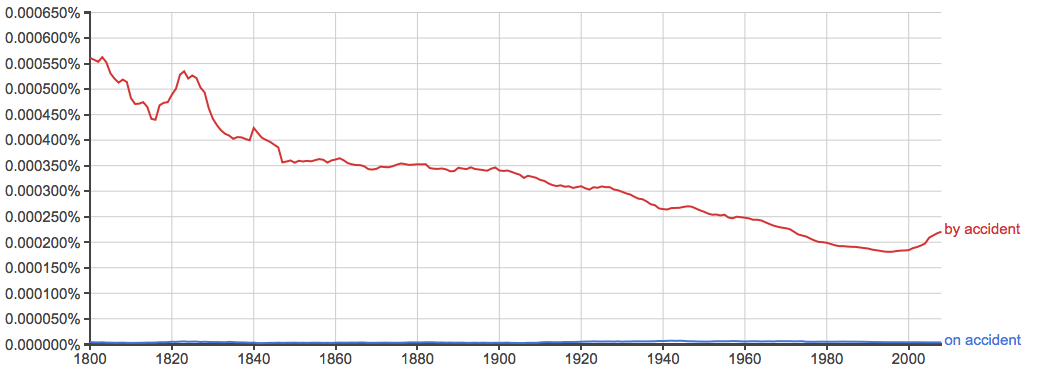Adverbs are useful, but too many of them can clutter up your writing and make it a chore to read. Sometimes, adverb phrases can fill the same function in a more eloquent manner.
On accident and by accident are adverb phrases that mean the same thing as accidentally. One could argue that they aren’t actually any more elegant than the simple adverb itself, but for variety’s sake, they can be interesting in their own right.
Which one should you use, though? Continue reading to find out about on accident and by accident.
What is the Difference Between On Accident and By Accident?
In this article, I will compare the phrase on accident vs. by accident. I will use each of these phrases in example sentences to showcase their proper context.
Plus, I will demonstrate the use of a mnemonic device that makes choosing by accident or on accident a little easier.
When to Use By Accident
 What does by accident mean? By accident is an adverb phrase. It is synonymous with the traditional adverb accidentally, which means not on purpose.
What does by accident mean? By accident is an adverb phrase. It is synonymous with the traditional adverb accidentally, which means not on purpose.
If you did not mean to spill a glass of milk, but you spilled it anyway, you would have done it by accident. Likewise, if you burned a batch of chocolate chip cookies, you would likely have done it by accident, and not on purpose.
Here are some more examples,
- If I hurt your feelings, it was by accident; you know I would never be mean to you on purpose.
- I tripped the waiter by accident, and she spilled our drinks all over the adjacent table.
- A record number of Americans are dying by accident and increasingly because of fatal overdoses and falls, and not so much in car crashes. –NPR
Adverbs and adverb phrases modify verbs by describing how they were performed. By accident and accidentally describe something that was not done intentionally.
When to Use On Accident
 What does on accident? On accident is a variant form of the same adverb phrase. Depending on the person you talk to, it may or may not be considered an error.
What does on accident? On accident is a variant form of the same adverb phrase. Depending on the person you talk to, it may or may not be considered an error.
Most style guides advise against the use of on accident, and as you can see, almost no one uses it in print.

Some point to the age of the writer or speaker for the differences in usage between by accident vs. on accident, stating that older speakers and writers are more likely to use by accident while younger ones are more likely to use on accident.
While this might be true in spoken English, it’s clearly not being transferred to formal written English. As the above graph shows, virtually no one uses on accident in professionally edited writing.
For every one use of on accident, there is 75 uses of by accident. In other words, professional writers and editors do not find on accident to be an acceptable variation of this phrase.
Trick to Remember the Difference
In spoken conversation, you can probably use whichever version sounds more natural to you, at least if you are speaking to an American.
In writing, though, by accident is the standard variant of this phrase. Since by comes before on in the alphabet, remember to use by accident before you even think of using on accident.
It might be an even better idea, though, to use the adverb accidentally instead in most contexts.
Summary
Is it on accident or by accident? By accident and on accident are two versions of an adverb phrase that means not on purpose.
- By accident is the standard, accepted form in print.
- On accident might be common in spoken American English, but it isn’t an acceptable form in writing and publishing.
Contents
